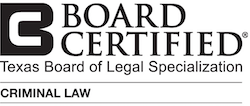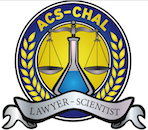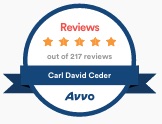Criminal Defense FAQ
Why Should I Hire A Criminal Defense Attorney?
The most important decision the accused can make is hiring the right criminal defense attorney. Don't make the mistake of using an attorney whose primary practice is NOT criminal defense. You wouldn't go to a dentist if you broke your arm, nor a pediatrician if you needed surgery. Likewise, do not hire a civil attorney to represent you in a criminal matter.
Most people familiar with the criminal justice process always advise against self-representation. There is an old adage which states: "He who represents himself has a fool for a client." Don't make this mistake. Although you technically have the legal right to do so, you are seriously putting yourself at a great disadvantage. Criminal laws change all the time, sometimes on a daily basis. That is why it is so important to consult with a criminal defense lawyer immediately who is familiar with the process, and who is committed to doing everything possible of staying on the cutting edge in new developments in the law. Criminal convictions can have serious consequences on your life. Therefore, it is best to place the situation of this unfortunate circumstance with someone who can help guide you to a favorable outcome.
Which Criminal Defense Attorney Should I Hire?
Choosing which criminal defense attorney to hire to help fight against the charges brought against you can be a very challenging task. Carl tells virtually every client he meets with to hire the attorney that they are most comfortable with. The reality of the situation is that you will be working with your attorney for an extended period of time, possibly even for a couple of years. Therefore, it is best to retain someone you feel comfortable with and who you believe you can trust. You are going to be relying on this person for advice and counsel. Therefore it is best to try and choose wisely.
It is also essential to hire an attorney who has the aptitude and talent to actually try a case to a jury. The reality of EVERY criminal case is that there is always the possibility that the case ultimately proceeds to trial. As such, it is important to consider hiring an attorney that has the ability to do this to help effectuate a positive outcome. Many attorneys "claim" that they will indeed try a case to a jury, but ultimately for one reason or another will find a way to avoid this outcome at all cost.
Many lawyers also make many "guarantees" on the front-end of a case, without knowing ANY of the facts underlying the arrest. It is advisable to stay away from ANY attorney that will GUARANTEE you a certain result while knowing very little about the charge before getting the opportunity to review the evidence. The reality of a criminal case is that there is no way to ascertain ahead of time what a judge, jury, or a prosecutor will do in any given scenario. Therefore, it is best to hire an attorney that will help guide you through the process and will try to best handle and inform you of the nature of the proceedings as facts and circumstances unfold.
Why Should I Hire Carl David Ceder?
Carl is an attorney that will always fiercely advocate for your rights...PERIOD. He cares about every client he interacts with, and wants the best for their lives going forward. He will always try to analyze each fact of every case, in an attempt to properly mount the best possible defense. He constantly stays abreast on the current changes in the law through seminars and different CLE classes pertaining to criminal defense, and will try and exhaust all resources to achieve a positive outcome.
Carl believes that it is a unique privilege when someone entrusts him with representation. As such, he will truly do everything in his power to try and help in every way possible. He is firmly devoted to the concept of "commitment" to his clients. It should be the cornerstone of the law practice of every criminal defense attorney who chooses to represent the accused. Carl's goal is for EVERY client he represents to leave his service fully satisifed feeling that they hired the best possible attorney for their case. It is his goal to try and gain the respect and trust of all of his clients, and for them to recommend his service to anyone in the future should they need his counsel and advice.
Carl loves every opportunity to try a case to a jury, as he firmly believes it is a fundamental right afforded by our founding fathers as recognized in both the Texas and United States Constitution. He thinks of every case immediately with what the potential ramifications could be if it proceeds to trial. Carl believes that this tenacious attitude will always lead to the best possible result, regardless of the facts of the case. While a great many cases do ultimately end as a result of a plea bargain, an effective criminal defense attorney has to always welcome and entertain the idea of proceeding with a jury trial if the situation truly demands.
To date, Carl has gained numerous acquittals in counties all across Texas. He has also obtained successful outcomes in cases that likely have resulted in an acquittal, but instead, the state offered to reduce the charge rather than risking submitting the case to a jury. Carl always wants to possess a reputation as an aggressive and zealous criminal defense attorney devoted to the constitutional rights and protection of the accused.
What Are Some Questions To Ask Before Hiring An Attorney?
There are many questions to be asked of your criminal defense attorney before you retain their services. Carl tells clients initially that hiring an attorney should be something not to be taken lightly and like any other major life decision, many factors should be considered before making a decision. Some questions to ask:
- Does the lawyer have experience successfully representing criminal cases that are similar to yours?
- Is the criminal attorney associated with any reputable legal associations?
- Would former clients have positive statements to make in regards to their experience working with them?
- Will the criminal attorney explain the legal process and all aspects of your case to you in a way that you can understand, including any and all plea bargain offers prior to a trial setting?
- Does the criminal attorney have the time and staff to adequately represent your legal matter?
- How many jury trials have they tried as a defense attorney, and NOT only as a prosecutor?
- How many jury trials have they won? How many jury trials have they lost?
- What are some of the facts of each jury trial won and lost?
When Should I Hire A Criminal Defense Attorney?
It is very important to hire your lawyer as soon as possible. Time is not on your side. The sooner your lawyer gets involved on your side, the better it is for you. It is also essential to inform your attorney the nature of the event underlying the charge as soon as possible, as usually your memory will be better sooner rather than later.
That being said, hiring an attorney is not something that should be rushed into. It is IMPERATIVE to hire the right lawyer. Most people are not familiar with how the criminal justice system works. It is therefore best to adequately put thoughtful consideration into which attorney you plan to place your faith and trust into. As is the case with any major purchase (a house, a car, etc.), you usually consult many useful resources in an attempt to make the best decision. As the possibility of any criminal charge can potentially include jail time, probation, and/or differing fines and fees, it is similarly just as important to make a deliberate decision when hiring your attorney.
When Do The Police Have To Read Me My Rights?
If you are a suspect, the police are required to read you your Miranda rights before conducting a "custodial interrogation." What exactly constitutes "custodial interrogation" has been the subject of many court cases, and is more complicated than you might expect. Clearly, not all discussion between the police and a suspect is "interrogation." Some discussions are different than interrogation, like merely simple interaction which might occur between police and a suspect to ask basic questions, for example. The police don't need to read a suspect his or her rights at this point. However, in some circumstances a police officer may be found to have interrogated a suspect in custody even without asking direct questions. Once a custodial interrogation begins, the police must read the suspects his or her rights and ensure that they are understood.
What Happens During A Jury Trial?
A jury trial is sometimes the only leverage the accused and an attorney has upon the power of the state. There are thousands of criminal charges filed everyday in counties all across Texas. With the time and resources limited by the State, only a small fraction of these can proceed to a jury trial.
Prosecutors generally like to try and be tough on crime, sometimes due to the political pressure to not be soft on charges like DWI. At the same time, prosecutors don't like trying cases they might lose. Therefore, setting cases for trial and preparing the case to win is sometimes the biggest "sword" a criminal defense attorney can have. Why? Because sometimes this forces the state to act more reasonable to offer a favorable resolution to a case.
The best tool an effective criminal attorney can use is setting a case for trial, and preparing to WIN. Carl has worked on cases where he and his team have shown up for trial settings, only to have the state drastically reduce, and on occasion, even dismiss the charges. A good criminal defense attorney who cannot draw upon a similar experience has not done a very good job for their clients.
If the case does proceed to trial, the first task will be for both attorneys to conduct a voir dire to try and select a fair and impartial jury. Many experts in the legal field say that the voir dire is the most important aspect to a trial.
After voir dire, each attorney will have the option of giving an opening statement. If the attorney for the accused exercises this option, they can deliver their opening statement after the state closes their case. After the opening statements, the state will then present their case calling different witnesses to the stand. Usually, this means at least one police officer. After the direct examination of each of these witnesses, the defense attorney will have the opportunity to cross-examine them on their trial testimony.
At the close of the state's case, the defense then gets to present their case. Sometimes the defense will opt not to exercise this option. To date, Carl has never been a part of a trial that has not elected to present some evidence in some form or fashion. He is a big believer that not doing so indicates laziness on behalf of the attorney.
After the end of the presentation of the defense case for the accused, closing "summation" arguments are then heard. After closing the jury then retires to deliberate on a verdict.
The entire process for a jury trial can range from hours, to days, sometimes weeks, and in some very serious accusations, as long as even a couple of months. Every trial is unique in that different witnesses have to be called and different evidence will be heard given the scenario and specific situation. Trials can be a very time-consuming and often can be a very difficult process. Carl thrives on the opportunity to be in trial, and believes this characteristic should be present in any criminal defense attorney who takes on the responsibility of representing the accused. It is important to retain the services of someone who is experienced with presenting cases to juries, as well as someone with the talent to effectively give you your best opportunity to WIN. You can read more about the criminal case process in Texas here.
Expunction/Non-Disclosure
A question Carl often encounters is whether an arrest and/or conviction can be expunged. Sometimes a criminal record can limit your future possibilities. It can keep you from getting the right job, or moving within your company, or even come back to haunt you should you be facing a criminal charge in the future. The answer to whether you can get something expunged or sealed is almost always complicated, and many factors usually come into play. A knowledgeable Texas attorney can help you take actions, however, in sealing these records and protecting your future.
The Law Offices of Carl David Ceder, PLLC, can help clients with two different methods of criminal record sealing: an expunction and a nondisclosure. Depending on the circumstances surrounding your detention, arrest or conviction, either one might be the right fit for you.
Expunction vs. Non-Disclosure:
Expunction: Expunction orders essentially erase ALL records of the offense: arrest records, court records and criminal history record information. Expunction is only granted in limited circumstances, contrary to what most people believe. These include when your criminal case was dismissed or when you were found "Not Guilty" and acquitted after a trial. People who are not eligible for expunction may still be eligible to file a motion for a non-disclosure.
Non-disclosure: When a petition for non-disclosure is granted, criminal justice agencies are prohibited from giving information about the offense to the general public. Usually, a motion for a non-disclosure is granted when you have successfully completed a deferred adjudication. For many offenses, there is a waiting period before you can file a petition for non-disclosure, which can range anywhere from two to five years. However, some offenses are eligible for non-disclosure immediately. Obtaining an order of nondisclosure means that law enforcement agencies cannot release your criminal record as it relates to a specific incident. Generally the only way an entity can see the arrest records is if you are prosecuted subsequently for another crime. If your petition is approved, your record is effectively sealed in all other respects.
What Should I Expect Going Forward?
Just because you hire an attorney does not mean that you do not have to participate and assist in the handling of your defense. Instead, you should simultaneously attempt to inform yourself and actively participate with the defense of your case. Ask questions and be honest and straightforward with all aspects of the charge. Remember what you tell your lawyer is ALWAYS confidential as a result of the attorney-client privileged relationship.
Carl has a core philosophy that he works together as a team with his clients to obtain the best result. The most favorable circumstances are usually as a result of when the accused works together with their attorney. In fact, it is almost impossible to do so absent this fact.
You can always expect an open line of communication with Carl. He will always answer any question you have, help you analyze any troubling factor associated with your case, and make sure you understand the risks and rewards attributed to varioius options. Communication is key to a successful defense, and Carl will always actively work to ensure that this is the foundation for any case he works on.
How Much Will Hiring An Attorney Cost?
This is a very common question whenever people are deciding to hire a criminal defense attorney. Unfortunately, it is an impossible question to answer absent hearing more regarding the facts of a case. However, it should be advised against hiring the cheapest attorney you can find. A cheap attorney isn't always good, and a good attorney isn't always cheap! In fact, a good defense usually takes time. Abraham Lincoln once said a "lawyer's time and advice are his stock and trade." This is perhaps the most true with criminal defense work. Thus, it is advisable not to pursue hiring and basing representation on who will charge you the cheapest rate.
That being said, what you should try to find is a lawyer who plans to charge a fee that is reasonable given the factors involved. Some of these factors could include the time and skill required to complete a certain task, what county the charge is filed in, and whether the charge is a felony or a misdemeanor.
The Law Offices of Carl David Ceder, PLLC, will always work to try and ensure that fees paid are always reasonable and commensurate with the time and labor involved with mounting a proper defense. While the facts and circumstances of every case are different, Carl will always try to ensure that all fees are reasonable. He also understands that usually people don't "plan" on having to hire n attorney to fight a criminal charge. With this in mind, he tries to offer flexible payment plans that will help make all fees affordable regardless of the nature of the charge.






















